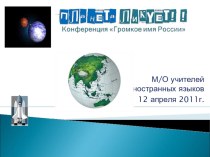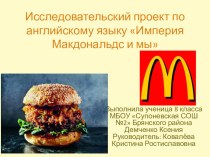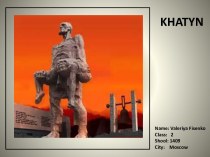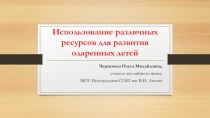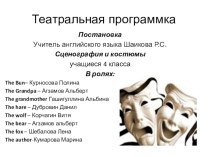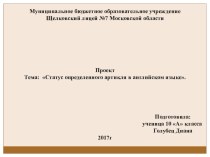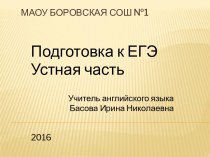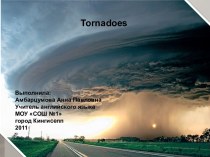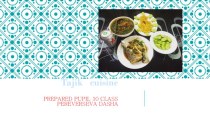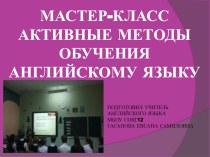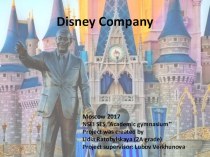- Главная
- Разное
- Бизнес и предпринимательство
- Образование
- Развлечения
- Государство
- Спорт
- Графика
- Культурология
- Еда и кулинария
- Лингвистика
- Религиоведение
- Черчение
- Физкультура
- ИЗО
- Психология
- Социология
- Английский язык
- Астрономия
- Алгебра
- Биология
- География
- Геометрия
- Детские презентации
- Информатика
- История
- Литература
- Маркетинг
- Математика
- Медицина
- Менеджмент
- Музыка
- МХК
- Немецкий язык
- ОБЖ
- Обществознание
- Окружающий мир
- Педагогика
- Русский язык
- Технология
- Физика
- Философия
- Химия
- Шаблоны, картинки для презентаций
- Экология
- Экономика
- Юриспруденция
Что такое findslide.org?
FindSlide.org - это сайт презентаций, докладов, шаблонов в формате PowerPoint.
Обратная связь
Email: Нажмите что бы посмотреть
Презентация на тему по английскому языку Химия вокруг нас
Содержание
- 2. Look around! All that we see: from
- 3. History of Glass The history
- 4. Only the purest varieties of quartz sand
- 5. OUR FOOD PROTEINS FATS VITAMINS AND SO ON... CARBOHYDRATES
- 6. HOUSE WE LIVE IN … glass, metal
- 7. Chemical elements in the human bodyMany scientists
- 8. Chemical fibersChemical fibers
- 9. capron viscose crimple acetate silk
- 10. a p p l i a n c e s metals alloys polimers semiconductors
- 11. Soap and
- 12. and, of course, transport… chemistry everywhere metals
- 13. winged chemistry aluminium titanium magnesium and other metals
- 15. The chemical composition of stars As the
- 16. Скачать презентацию
- 17. Похожие презентации
Look around! All that we see: from an elementary match to a beautiful blue sky above your head, you can also consider from another point of view - from the point of view of the remarkable
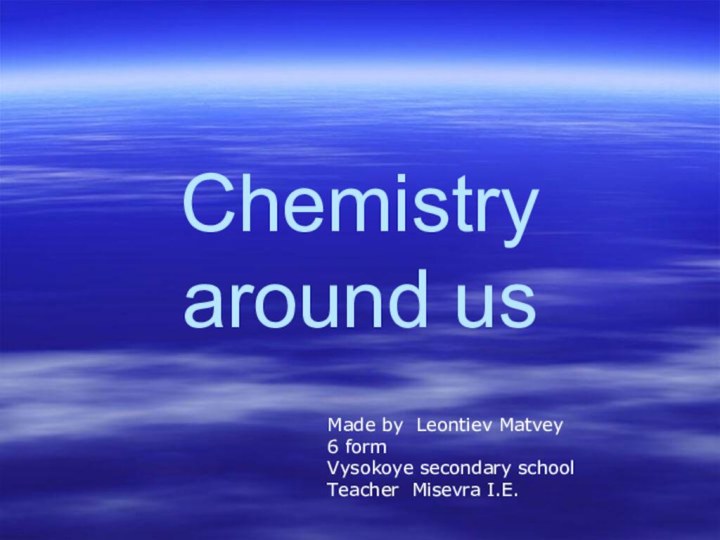
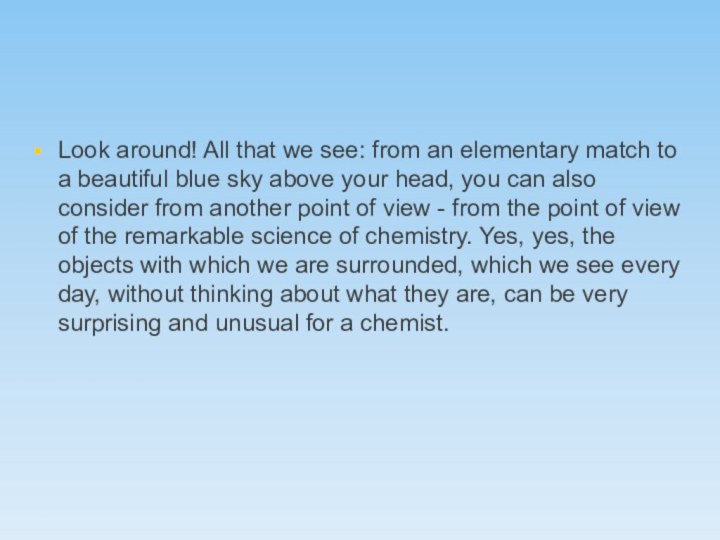
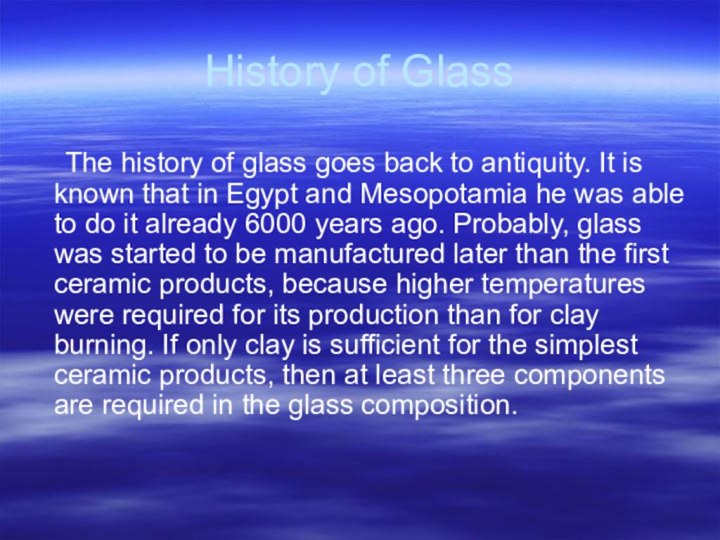
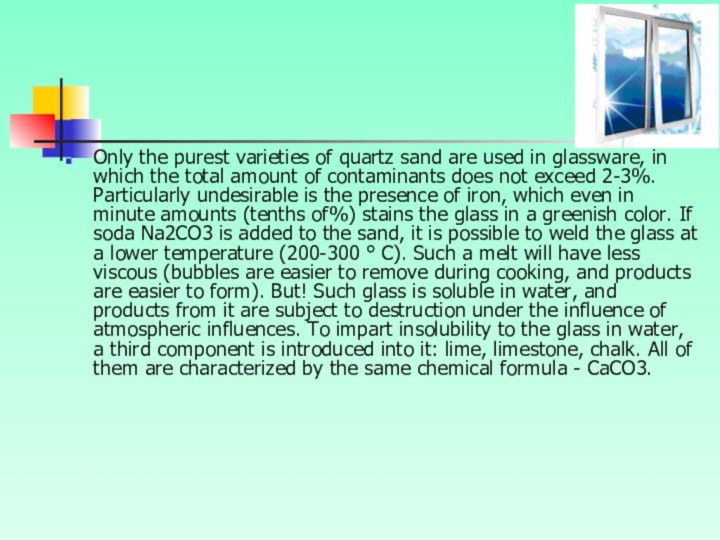
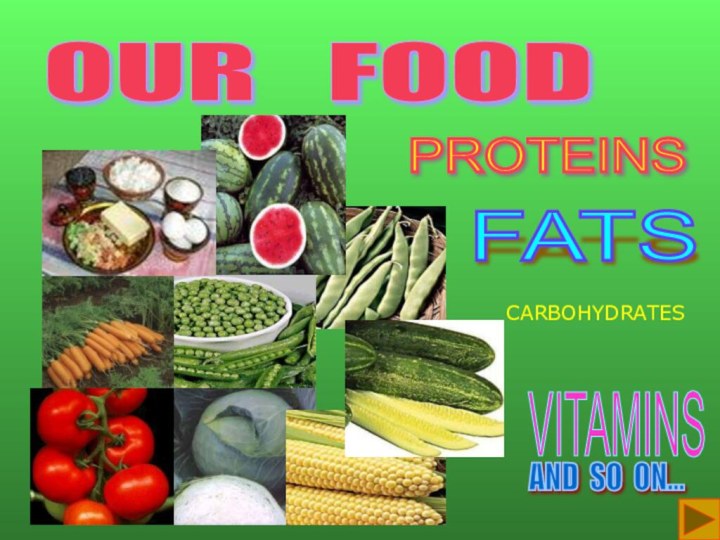

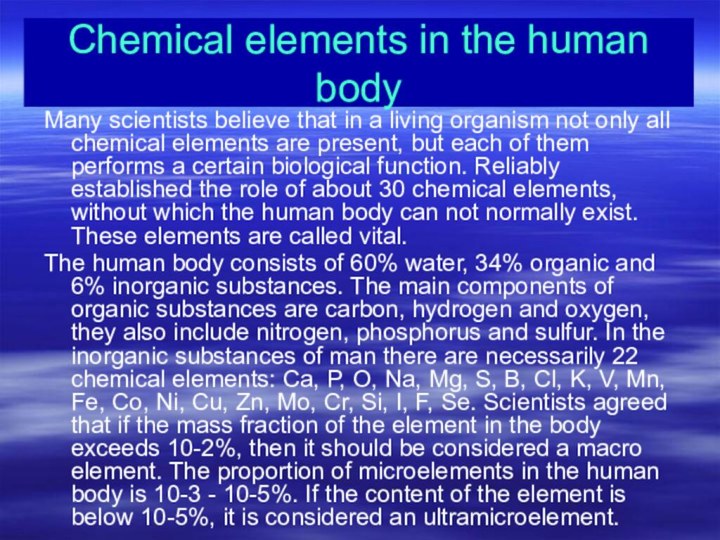
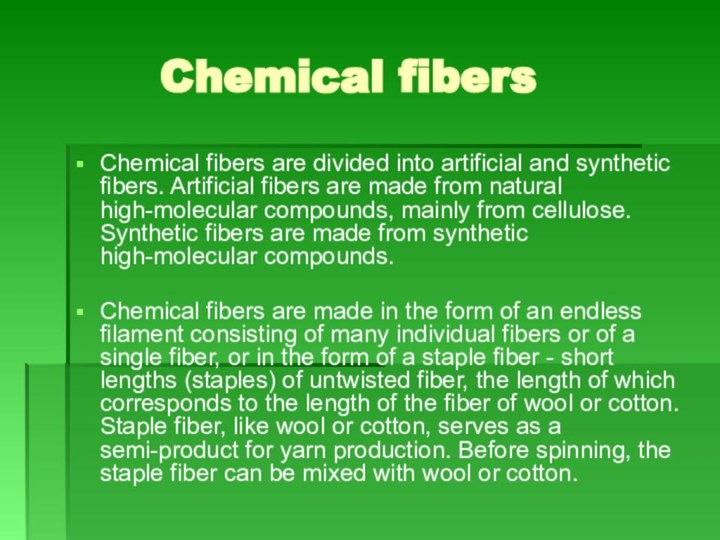
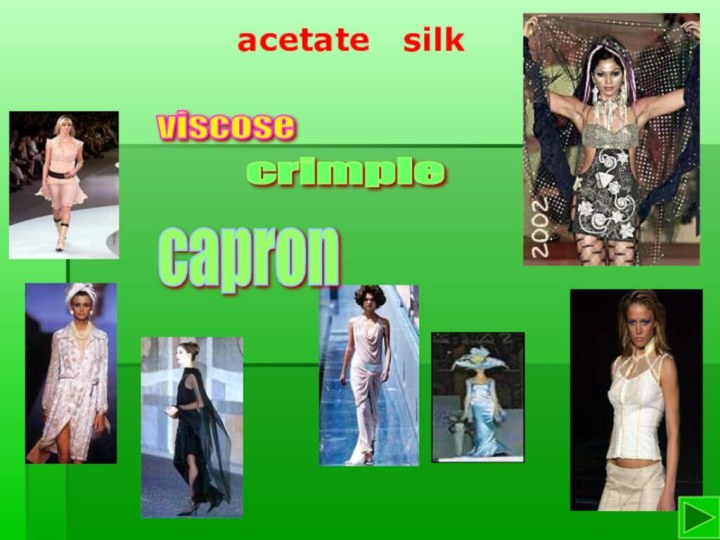

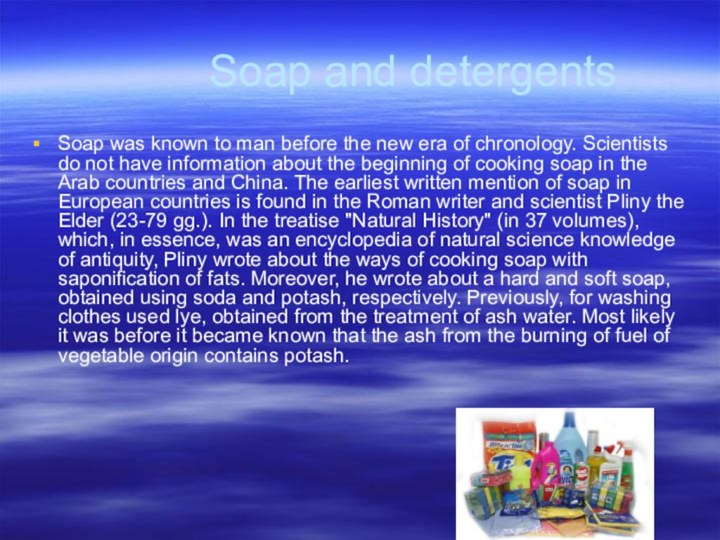
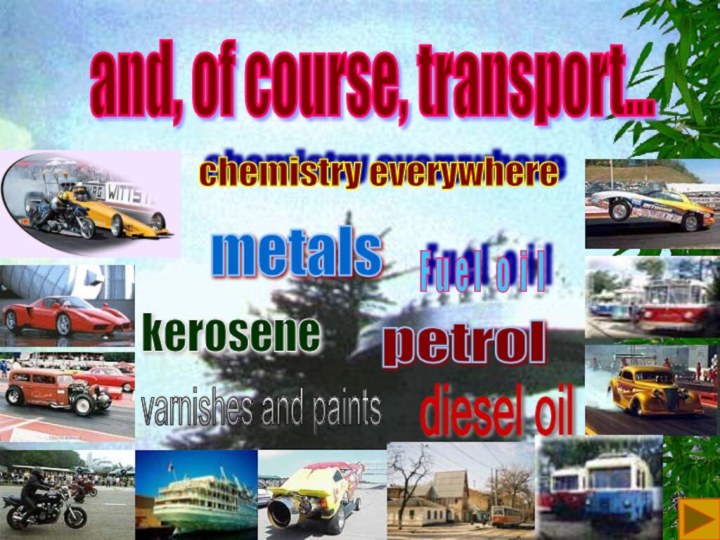
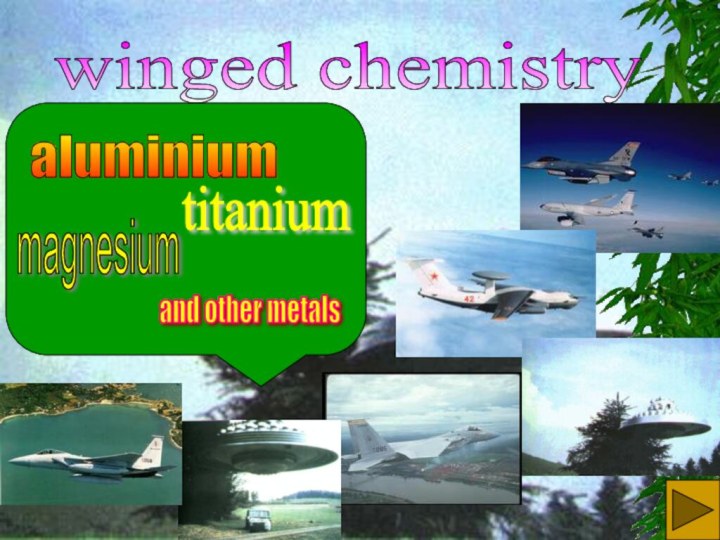
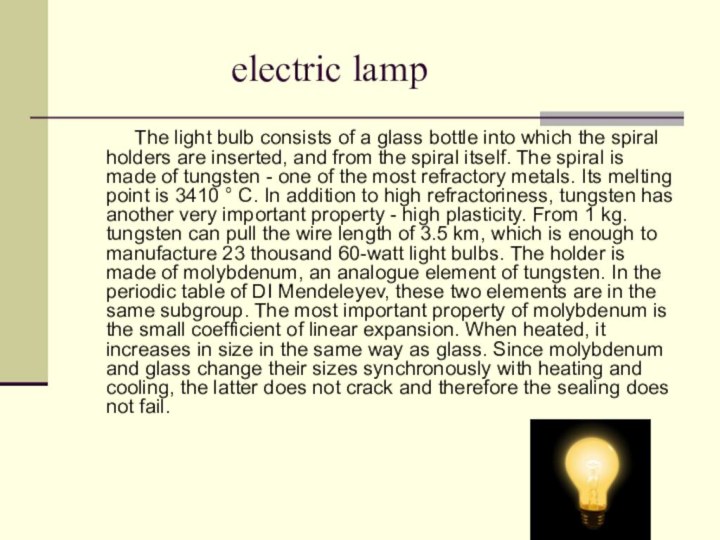
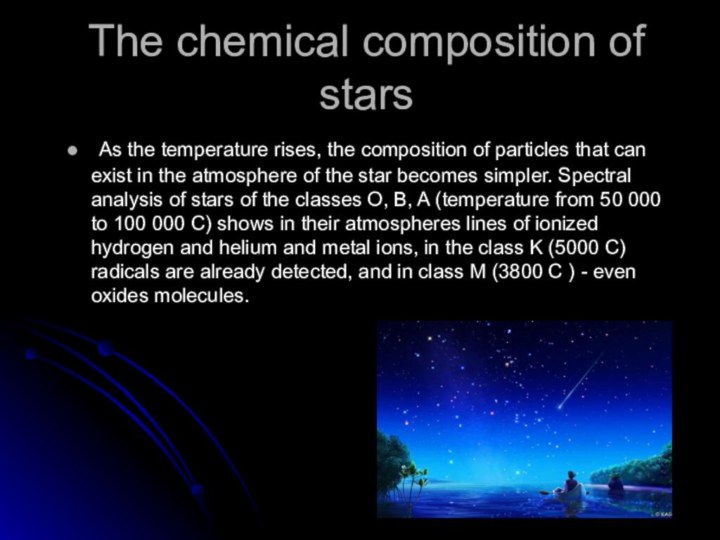
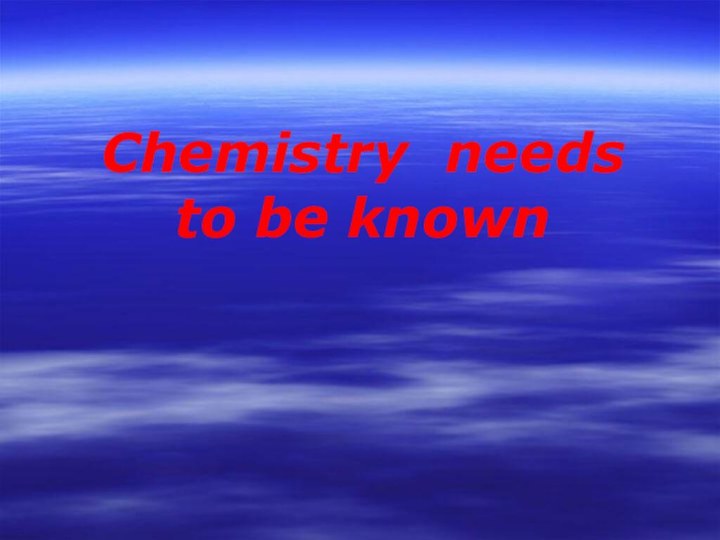
Слайд 3
History of Glass
The history of
glass goes back to antiquity. It is known that
in Egypt and Mesopotamia he was able to do it already 6000 years ago. Probably, glass was started to be manufactured later than the first ceramic products, because higher temperatures were required for its production than for clay burning. If only clay is sufficient for the simplest ceramic products, then at least three components are required in the glass composition.Слайд 4 Only the purest varieties of quartz sand are
used in glassware, in which the total amount of
contaminants does not exceed 2-3%. Particularly undesirable is the presence of iron, which even in minute amounts (tenths of%) stains the glass in a greenish color. If soda Na2CO3 is added to the sand, it is possible to weld the glass at a lower temperature (200-300 ° C). Such a melt will have less viscous (bubbles are easier to remove during cooking, and products are easier to form). But! Such glass is soluble in water, and products from it are subject to destruction under the influence of atmospheric influences. To impart insolubility to the glass in water, a third component is introduced into it: lime, limestone, chalk. All of them are characterized by the same chemical formula - CaCO3.
Слайд 6
HOUSE WE LIVE IN …
glass, metal
concrete,
reinforced concrete,
brick, paint, asbestos. roofing material.
drying oil,
var,refractory impregnation, nails,
instruments...
Слайд 7
Chemical elements in the human body
Many scientists believe
that in a living organism not only all chemical
elements are present, but each of them performs a certain biological function. Reliably established the role of about 30 chemical elements, without which the human body can not normally exist. These elements are called vital.The human body consists of 60% water, 34% organic and 6% inorganic substances. The main components of organic substances are carbon, hydrogen and oxygen, they also include nitrogen, phosphorus and sulfur. In the inorganic substances of man there are necessarily 22 chemical elements: Ca, P, O, Na, Mg, S, B, Cl, K, V, Mn, Fe, Co, Ni, Cu, Zn, Mo, Cr, Si, I, F, Se. Scientists agreed that if the mass fraction of the element in the body exceeds 10-2%, then it should be considered a macro element. The proportion of microelements in the human body is 10-3 - 10-5%. If the content of the element is below 10-5%, it is considered an ultramicroelement.
Слайд 8
Chemical fibers
Chemical fibers are
divided into artificial and synthetic fibers. Artificial fibers are
made from natural high-molecular compounds, mainly from cellulose. Synthetic fibers are made from synthetic high-molecular compounds.Chemical fibers are made in the form of an endless filament consisting of many individual fibers or of a single fiber, or in the form of a staple fiber - short lengths (staples) of untwisted fiber, the length of which corresponds to the length of the fiber of wool or cotton. Staple fiber, like wool or cotton, serves as a semi-product for yarn production. Before spinning, the staple fiber can be mixed with wool or cotton.
Слайд 11
Soap and detergents
Soap
was known to man before the new era of
chronology. Scientists do not have information about the beginning of cooking soap in the Arab countries and China. The earliest written mention of soap in European countries is found in the Roman writer and scientist Pliny the Elder (23-79 gg.). In the treatise "Natural History" (in 37 volumes), which, in essence, was an encyclopedia of natural science knowledge of antiquity, Pliny wrote about the ways of cooking soap with saponification of fats. Moreover, he wrote about a hard and soft soap, obtained using soda and potash, respectively. Previously, for washing clothes used lye, obtained from the treatment of ash water. Most likely it was before it became known that the ash from the burning of fuel of vegetable origin contains potash.
Слайд 12
and, of course, transport…
chemistry everywhere
metals
petrol
kerosene
F u e l o i l
diesel oil
varnishes and paints



